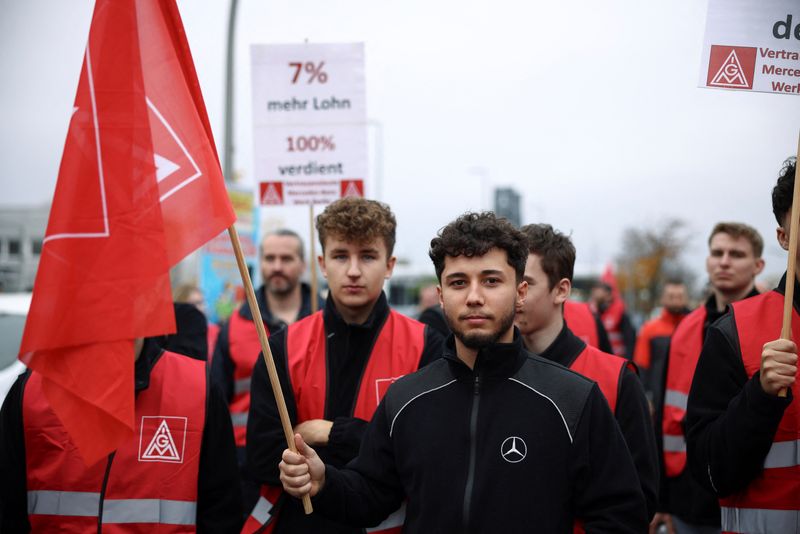By Maria Martinez and Matthias Williams
BERLIN (Reuters) -Thousands of German workers launched nationwide strikes to press for higher wages on Tuesday, compounding problems for companies worried about staying globally competitive as high costs, weak exports and foreign rivals chip away at their strengths.
The strikes by unionised workers in the nearly four-million strong electrical engineering and metal industries hit companies such as Porsche AG, BMW (ETR:BMWG) and Mercedes.
Also this week, car giant Volkswagen (ETR:VOWG_p) could announce plans to shut three plants on home soil for the first time in its 87-year history, as well as mass layoffs and 10% wage cuts for workers who keep their jobs.
A worsening business outlook in Europe's largest economy has piled pressure on Chancellor Olaf Scholz's rickety coalition government, which could be on the verge of collapse ahead of federal elections next year as policy cracks widen.
Scholz hosted a meeting with business leaders on Tuesday, including Volkswagen boss Oliver Blume, to discuss strategies for bolstering Germany's industrial sector.
The three-hour closed-door meeting in Berlin was aimed at exploring policy measures to drive growth, protect industrial jobs, and reinforce Germany’s position as a global industrial hub, government spokesperson Steffen Hebestreit said in a statement.
The talks mark the beginning of a broader initiative by the German government, with follow-up discussions planned for Nov. 15, Hebestreit added.
In a sign of government dysfunction, his finance minister has also announced a separate summit on the same day.
Germany has a long history of so-called "warning strikes" during wage negotiations, but they come at a time of employers' deepening concerns about the future. A leading business group said a survey of companies pointed to Germany experiencing another year of economic contraction in 2024 and no prospect of growth next year.
"We are not just dealing with a cyclical, but a stubborn structural crisis in Germany," said Martin Wansleben, managing director of the German Chamber of Commerce and Industry (DIHK)that conducted the survey.
"We are greatly concerned about how much Germany is becoming an economic burden for Europe and can no longer fulfil its role as an economic workhorse," he said.
A separate survey by the VDA auto industry association suggested the transformation of the German car industry could lead to 186,000 job losses by 2035, of which roughly a quarter have already occurred.
"Europe - especially Germany - is losing more and more international competitiveness," the VDA report said. It said German companies paid up to three times more for electricity than their U.S. or Chinese rivals, while facing higher taxes and increasing bureaucratic burdens.
WORKERS WANT THEIR SHARE
The International Monetary Fund joined those calling for reforms in Germany, suggesting the government ditch a constitutionally enshrined borrowing cap known as the debt brake so it can boost investment.
While the debt brake is supported by Finance Minister Christian Lindner, he is at odds with Economy Minister Robert Habeck, who has called for a multibillion-euro fund to stimulate growth.
"The economic policy debate is where it belongs: right at the top of the agenda," Lindner said on X. "We have no time to lose."
The meetings with Lindner and Scholz have prompted companies and industry associations to air their gripes. The chemicals lobby VCI lamented "poor framework conditions" and high energy costs faced by its members, and called on Scholz to make "groundbreaking decisions" to unleash competitiveness.
Reinhold von Eben-Worlee, from the association of family-run companies, compared the plight of Germany's Mittelstand firms to a marathon runner weighed down by a heavy rucksack of high taxes and social security contributions, and red tape.
Tuesday's strikes were orchestrated by the powerful IG Metall union, which also staged a walkout during the night shift at Volkswagen's plant in the city of Osnabrueck, where workers worry the site may be shutting down.
Approximately 71,000 workers participated in Tuesday's strike, impacting around 370 companies across Germany, according to a spokesperson for IG Metall.
IG Metall is demanding 7% pay rises compared to the 3.6% raise over a period of 27 months offered by employers' associations. Companies say the demands are unrealistic.
At the Porsche AG Zuffenhausen plant in Stuttgart, 500 employees walked out during the night shift and then around 4,000 employees went on strike during the early shift to join a demonstration, according to a statement.
Separately, the next round of talks between Volkswagen and labour representatives is due on Wednesday, when the group's third quarter results could lay bare the extent of its woes, with analysts forecasting a 40% drop in quarterly operating profit.
In the Bavarian city of Ingolstadt, workers marched to thumping beats, blew whistles and waved flags at a factory for Audi, which is part of the Volkswagen group.

"There is enormous pressure in the pot. Our employees, works council, IG Metall are standing together to look for alternatives to the job cuts and also to the plant closures," IG Metall chief Christiane Benner told Reuters at the strike.
"We will try to develop intelligent concepts. And we do not accept that our employees should pay for management errors."
